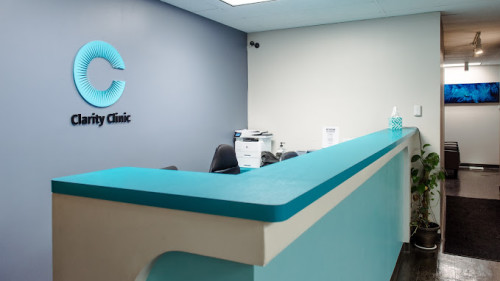





Clarity Clinic River North
Treatment Focus
This center treats substance use disorders and mental health conditions. You'll receive individualized care catered to your unique situation and diagnosis, learn practical skills for recovery, and make new connections in a restorative environment.
Primary Level of Care
Delivers regular one-on-one sessions focused on emotional support, coping strategies, and goal-setting, fostering long-term healing and personal development in an outpatient setting.
Claimed
Recovery.com has connected directly with this treatment provider to validate the information in their profile.
Treatment Focus
This center treats substance use disorders and mental health conditions. You'll receive individualized care catered to your unique situation and diagnosis, learn practical skills for recovery, and make new connections in a restorative environment.
Primary Level of Care
Delivers regular one-on-one sessions focused on emotional support, coping strategies, and goal-setting, fostering long-term healing and personal development in an outpatient setting.
Provider's Policy
Our mental health services are insurance-friendly and accessible
Clarity Clinic River North
Clarity Clinic River North
About Clarity Clinic River North
One of the largest and fastest growing psychiatry clinics in Illinois, Clarity Clinic River North is one of several outpatient private therapy providers in the Chicagoland and Illinois area providing treatment for mental health and substance abuse conditions in clients of all ages. They offer expert care that is personally tailored for each individual, providing evidence-based treatment for a range of disorders. Conditions treated include drug or alcohol addiction, mental health conditions such as depression, bipolar disorder, schizophrenia and anxiety, various eating disorders, personality disorders including borderline personality disorder (BPD), and neurodivergent testing and treatment for individuals with attention deficit disorder (ADHD) or autism spectrum disorder (ASD).
Specialized Evidence-Based Care
Clarity Clinic offers individual treatment that can be tailored for men, women, children, and families who are experiencing divorce or domestic violence situations, providing a safe space for emotional support, coping skills, and problem-solving. They provide multiple forms of group, individual, and child therapy for families in need of support.
Understanding the importance of early intervention, Clarity Clinic offers pediatric therapy, specialized care for children and adolescents experiencing emotional, behavioral, and developmental challenges.
With a specialized LGBTQIA+ treatment program, individuals can seek help from dedicated specialists who will help guide them through issues related to coming out, family dynamics, and navigating relationships. Psychotherapy at Clarity Clinic also serves as an outlet for individuals to address gender dysphoria.
Clarity Clinic also offers treatment to individuals struggling with behavioral disorders such as obsessive compulsive disorder (OCD) and post traumatic stress disorder (PTSD), phobias or irrational fears, narcissism, occupational difficulties and stress management, excessive sadness, grief and bereavement, anger management, self-esteem, suicidal thoughts, and social anxiety. Treatment is offered for sleep disorders such as insomnia or daytime sleepiness, addressing and improving potential contributing factors such as poor diet, anxiety, depression, or sleep apnea.
Proven, evidence-based methods such as cognitive behavioral therapy (CBT), dialectical behavior therapy (DBT), motivational interviewing (MI), mindfulness, and family therapy are utilized by specialized clinicians to treat various eating disorders. Binge eating, compulsive eating, anorexia nervosa, and bulimia are among some of the conditions they treat.
Dedicated psychiatrists and therapists address a myriad of health issues targeting specific issues that are unique to the experiences of both men and women, including weight loss, sexual performance issues, substance abuse, or mental health conditions like depression and anxiety and how they may present differently. Marriage and couples therapy focuses on working with both partners to develop positive conflict resolution skills and foster growth in relationships. Clarity Clinic River North also offers therapy for families and individuals struggling with dementia, providing effective coping strategies and problem-solving skills.
In addition to private therapy, life coaching is available to assist clients who are trying to make substantial changes such as weight loss, career change, or gain overall stability in their lives.
Innovative Treatments
Clarity Clinic’s Chicago location offers innovative treatment methods such as eye movement desensitization and reprocessing (EMDR), a popular method for trauma and PTSD. EMDR has patients focus on their trauma memory while experiencing a specific pattern of eye movement stimuli to reduce the brain’s emotional response to the trauma and help promote healing.
Certified addiction specialists and drug and alcohol counselors work with the treatment team to provide compassionate, holistic treatment to clients. In addition to a holistic approach and evidence-based psychotherapy, medication-assisted treatment (MAT) and medication management services are available.
Clarity Clinic River North is in-network with most major insurance providers.
Center Overview
Treatment Focus
This center treats substance use disorders and mental health conditions. You'll receive individualized care catered to your unique situation and diagnosis, learn practical skills for recovery, and make new connections in a restorative environment.
Insurance Accepted
Cash Pay Rates
Estimated Cash Pay Rate
Center pricing can vary based on program and length of stay. Contact the center for more information. Recovery.com strives for price transparency so you can make an informed decision.
Levels of Care






Your Care Options
Specializations
Private Therapy
This is an individual therapy that's often available at private therapy clinics. Clients may be able to choose a therapist who best fits their unique needs.
Depression
Symptoms of depression may include fatigue, a sense of numbness, and loss of interest in activities. This condition can range from mild to severe.
Drug Addiction
Drug addiction is the excessive and repetitive use of substances, despite harmful consequences to a person's life, health, and relationships.
Eating Disorders
An eating disorder is a long-term pattern of unhealthy behavior relating to food. Most people with eating disorders have a distorted self-image.
Who We Treat
Men and Women
Men and women attend treatment for addiction in a co-ed setting, going to therapy groups together to share experiences, struggles, and successes.
Adolescents
Teens receive the treatment they need for mental health disorders and addiction, with the added support of educational and vocational services.
Children
Treatment for children incorporates the psychiatric care they need and education, often led by on-site teachers to keep children on track with school.
LGBTQ+
Addiction and mental illnesses in the LGBTQ+ community must be treated with an affirming, safe, and relevant approach, which many centers provide.
Approaches
Personalized Treatment
The specific needs, histories, and conditions of individual patients receive personalized, highly relevant care throughout their recovery journey.
Evidence-Based
A combination of scientifically rooted therapies and treatments make up evidence-based care, defined by their measured and proven results.
Individual Treatment
Individual care meets the needs of each patient, using personalized treatment to provide them the most relevant care and greatest chance of success.
Therapies
Stress Management
Patients learn specific stress management techniques, like breathing exercises and how to safely anticipate triggers.
1-on-1 Counseling
Patient and therapist meet 1-on-1 to work through difficult emotions and behavioral challenges in a personal, private setting.
Family Therapy
Family therapy addresses group dynamics within a family system, with a focus on improving communication and interrupting unhealthy relationship patterns.
Art Therapy
Visual art invites patients to examine the emotions within their work, focusing on the process of creativity and its gentle therapeutic power.
Trauma-Specific Therapy
This form of talk therapy addresses any childhood trauma at the root of a patient's current diagnosis.
Nutrition Counseling
Nutritious food helps patients heal from within, setting them up for mental and bodily wellness as they learn about healthy eating.
Conditions We Treat
Post Traumatic Stress Disorder
PTSD is a long-term mental health issue caused by a disturbing event or events. Symptoms include anxiety, dissociation, flashbacks, and intrusive thoughts.
Anxiety
Anxiety is a common mental health condition that can include excessive worry, panic attacks, physical tension, and increased blood pressure.
Depression
Symptoms of depression may include fatigue, a sense of numbness, and loss of interest in activities. This condition can range from mild to severe.
Schizophrenia
Schizophrenia is a serious mental health condition that causes hallucinations, delusions, and disordered thinking.
Grief and Loss
Grief is a natural reaction to loss, but severe grief can interfere with your ability to function. You can get treatment for this condition.
Suicidality
With suicidality, a person fantasizes about suicide, or makes a plan to carry it out. This is a serious mental health symptom.
Obsessive Compulsive Disorder (OCD)
OCD is characterized by intrusive and distressing thoughts that drive repetitive behaviors. This pattern disrupts daily life and relationships.
Personality Disorders
Personality disorders destabilize the way a person thinks, feels, and behaves. If untreated, they can undermine relationships and lead to severe distress.
Substances We Treat
Cocaine
Cocaine is a stimulant with euphoric effects. Agitation, muscle ticks, psychosis, and heart issues are common symptoms of cocaine abuse.
Prescription Drugs
It's possible to abuse any drug, even prescribed ones. If you crave a medication, or regularly take it more than directed, you may have an addiction.
Benzodiazepines
Benzodiazepines are prescribed to treat anxiety and sleep issues. They are highly habit forming, and their abuse can cause mood changes and poor judgement.
Co-Occurring Disorders
A person with multiple mental health diagnoses, such as addiction and depression, has co-occurring disorders also called dual diagnosis.
Drug Addiction
Drug addiction is the excessive and repetitive use of substances, despite harmful consequences to a person's life, health, and relationships.
Heroin
Heroin is a highly addictive and illegal opioid. It can cause insomnia, collapsed veins, heart issues, and additional mental health issues.
Methamphetamine
Methamphetamine, or meth, increases energy, agitation, and paranoia. Long-term use can result in severe physical and mental health issues.
Opioids
Opioids produce pain-relief and euphoria, which can lead to addiction. This class of drugs includes prescribed medication and the illegal drug heroin.
Languages
Care Designed for Your Needs
Special Considerations
Couples program
Using gentle clinical care, therapists guide patients and their partner through guided sessions to address issues and work towards lasting solutions.





